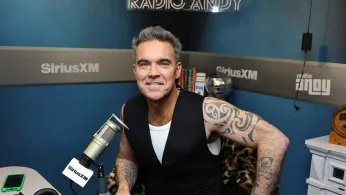
2 hours ago
Robbie Williams Reveals Tourette Syndrome Diagnosis
READ TIME: 3 MIN.
International pop icon and former Take That member Robbie Williams has publicly disclosed his diagnosis of Tourette syndrome, marking the first time he has spoken openly about the condition. Williams’s candid revelation came during a recent episode of the podcast "I'm ADHD! No You're Not," hosted by Paul Whitehouse and Dr Mine Conkbayir, where he reflected on the nature of his symptoms and the challenges of living with an often misunderstood neurological disorder .
Unlike many who experience Tourette’s as involuntary, outward physical or vocal tics, Williams shared that his symptoms primarily manifest internally, in the form of intrusive thoughts. “I’ve just realised that I have Tourette’s, but they don’t come out,” Williams explained. “They are intrusive thoughts that happen. I was just walking down the road the other day, and I realised that these intrusive thoughts are inside Tourette’s. It just doesn’t come out” .
Williams’s revelation adds to his previously documented experiences with Attention Deficit Hyperactivity Disorder (ADHD) and addiction, issues he has discussed throughout his career. He described how the internal manifestations of Tourette’s can present unique challenges, especially during live performances. “You would think that a stadium full of people professing their love to you would work as , but whatever it is inside me cannot hear it. I cannot take it in,” Williams shared, highlighting the disconnect between public perception and private reality .
The singer, now in the midst of his Britpop tour, admitted to having a “complicated relationship” with touring and performing live. Despite projecting confidence and bravado on stage, Williams confessed, “I mask like I’m an Olympian at masking. I will look full of bravado and look pompous and look smug and do these grand gestures, which have worked for me because they put my face on the poster and people still buy tickets. But actually, what’s happening is, I feel like the opposite of that all the time” .
Tourette syndrome is a neurological condition characterized by involuntary sounds and movements called tics. While visible symptoms are typically associated with the disorder, Williams’s experience draws attention to the spectrum of presentations, including internal symptoms such as intrusive thoughts. According to the UK National Health Service, Tourette syndrome is often inherited and can be exacerbated by stress, excitement, or fatigue .
Williams’s openness follows similar disclosures by other public figures, such as Scottish singer Lewis Capaldi, whose visible tics led to a 2023 hiatus from music after he was unable to complete his performance at Glastonbury . These high-profile admissions foster a broader public understanding of neurodiversity, helping to destigmatize conditions that are often misrepresented or misunderstood.
While Williams has not publicly identified as LGBTQ+, his openness about neurodiversity and mental health resonates across marginalized communities, including LGBTQ+ individuals who statistically face disproportionate barriers to mental health care and higher rates of neurodivergent diagnoses . Visibility from celebrities and allies can help shift cultural narratives, creating space for dialogue around mental health in both mainstream and LGBTQ+ circles.
Advocates emphasize that intersectionality—recognizing the interconnectedness of social categorizations such as gender, sexuality, and disability—is essential in crafting inclusive mental health resources. By sharing his personal challenges, Williams contributes to ongoing efforts to affirm that neurodiverse people, including those within the LGBTQ+ community, deserve acceptance, support, and visibility.
Williams credited his spouse, Ayda Field Williams, with helping him reframe his experience, particularly regarding the pressures of performance. He noted that her support has played a significant role in his journey toward self-understanding and acceptance, echoing the importance of chosen family and support networks often celebrated within LGBTQ+ communities .
He further acknowledged that his comfort zone is largely confined to the privacy of his own bed, yet he has noticed improvements in managing his symptoms since turning 45. The role of supportive partners, friends, and allies is frequently highlighted as a critical factor in the well-being of individuals navigating mental health and neurodiversity.
Williams’s public acknowledgement of his Tourette syndrome diagnosis arrives at a moment when conversations around mental health and neurodiversity are gaining momentum globally. Advocacy groups, including those focused on LGBTQ+ well-being, continue to call for greater visibility, research, and culturally competent care for neurodiverse people .
As Williams continues his Britpop tour and explores new creative endeavors, his transparency stands as a testament to the power of vulnerability and the ongoing need to destigmatize mental health conditions—on stage, in the media, and in every community.






